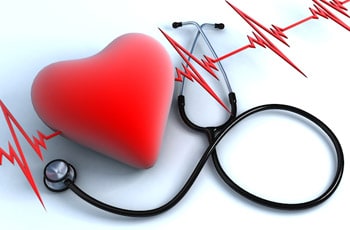Exercise protects against heart disease in many ways. One important mechanism is by elevating HDL, a.k.a. the “good” cholesterol.[1] It is well established that high levels of HDL are protective against cardiovascular disease and the National Cholesterol Education Program (NCEP) has emphasized increasing HDL levels to help reduce CHD risk. [2-4] However, not only HDL levels are important. Emerging research in showing that HDL quality and function is as important, if not more important for health promotion and prevention of cardiovascular and metabolic diseases…[5-7]
Researchers from the University of California/Los Angeles (UCLA, California, USA) investigated HDL quality in three groups of young men:[8]

1) overweight untrained
(BMI 30 – no training)
2) overweight trained
(BMI 29 – 4 d or more per week resistance training)
3) lean trained
(BMI 24 – 4 d or more per week resistance training)
It was found that HDL function was significantly better in both trained groups compared with the overweight untrained group. However, HDL function in the overweight trained group was not significantly different from that of the lean trained group.
Thus, muscular fitness is more important than body weight for HDL functionality and could be a potential mechanism by which resistance training may decrease cardiovascular disease risk.
Interestingly, it was noted that some metabolic and hormonal parameters were related to HDL functionality. High HDL function not only correlated with lower oxidized LDL, which is implicated in atherosclerosis, but also with higher testosterone levels. The latter can explain why low testosterone levels are associated with increased cardiovascular disease risk.[9-12]
This is the first study to demonstrate a relationship between HDL redox activity (an aspect of HDL function) and testosterone. 🙂
References:
1. Pattyn, N., et al., The effect of exercise on the cardiovascular risk factors constituting the metabolic syndrome: a meta-analysis of controlled trials. Sports Med, 2013. 43(2): p. 121-33.
2. Barter, P., HDL-C: role as a risk modifier. Atheroscler Suppl, 2011. 12(3): p. 267-70.
3. Sharma, R.K., V.N. Singh, and H.K. Reddy, Thinking beyond low-density lipoprotein cholesterol: strategies to further reduce cardiovascular risk. Vasc Health Risk Manag, 2009. 5: p. 793-9.
4. McGrowder, D., et al., The role of high-density lipoproteins in reducing the risk of vascular diseases, neurogenerative disorders, and cancer. Cholesterol, 2011. 2011: p. 496925.
5. Eren, E., N. Yilmaz, and O. Aydin, High Density Lipoprotein and it’s Dysfunction. Open Biochem J, 2012. 6: p. 78-93.
6. Kontush, A. and M.J. Chapman, Functionally defective high-density lipoprotein: a new therapeutic target at the crossroads of dyslipidemia, inflammation, and atherosclerosis. Pharmacol Rev, 2006. 58(3): p. 342-74.
7. Besler, C., T.F. Luscher, and U. Landmesser, Molecular mechanisms of vascular effects of High-density lipoprotein: alterations in cardiovascular disease. EMBO Mol Med, 2012. 4(4): p. 251-68.
8. Roberts, C.K., et al., Untrained young men have dysfunctional HDL compared with strength-trained men irrespective of body weight status. J Appl Physiol (1985), 2013. 115(7): p. 1043-9.
9. Bhasin, S., Effects of testosterone administration on fat distribution, insulin sensitivity, and atherosclerosis progression. Clin Infect Dis, 2003. 37 Suppl 2: p. S142-9.
10. Eckardstein, A. and F.C. Wu, Testosterone and atherosclerosis. Growth Horm IGF Res, 2003. 13 Suppl A: p. S72-84.
11. Manolakou, P., et al., The effects of endogenous and exogenous androgens on cardiovascular disease risk factors and progression. Reprod Biol Endocrinol, 2009. 7: p. 44.
12. Kelly, D.M. and T.H. Jones, Testosterone: a vascular hormone in health and disease. J Endocrinol, 2013. 217(3): p. R47-71.









I have found this to be true with many of my clients over the years. Glad to see the research surfacing.
“However, HDL function in the overweight trained group was not significantly different” – Scientifically speaking this study demonstrates that resistance training has no effect on HDL. Please don’t be subjective in your conclusions…
That HDL function in the overweight trained group was not significantly different from that of the lean trained group, means that weight training seems to counteract the negative effects obesity has on HDL.
How do you see that as “subjective”? Data supports that statement.
Excellent information . . . answers a specific question I have had for years! I very much enjoy and appreciate Monica’s timely and insightful information and indepth articles. Thank you!
I’m glad to hear that. More to come. 🙂